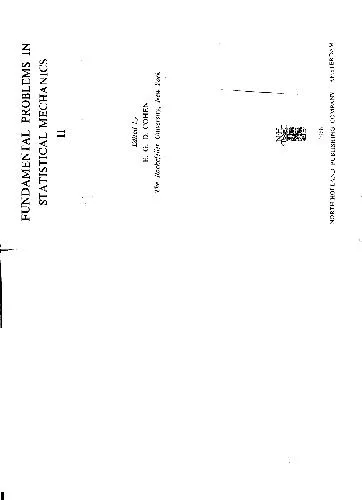Random walks in biology
4.7
Reviews from our users

You Can Ask your questions from this book's AI after Login
Each download or ask from book AI costs 2 points. To earn more free points, please visit the Points Guide Page and complete some valuable actions.Related Refrences:
Introduction to "Random Walks in Biology"
Welcome to the engrossing world of biological motion, explored meticulously in "Random Walks in Biology." This book presents an innovative perspective on how randomness, so often perceived as chaotic, is a fundamental component of biological systems. Through the lens of random walks, this work unravels the complexity of movement seen in biological organisms and processes at various scales. Using mathematical principles, Howard C. Berg unfolds the intricacies of motion occurring in cells, organisms, and even populations, bridging the gap between theoretical concepts and biological applications.
Summary of the Book
"Random Walks in Biology" is more than just a mathematical exploration; it is an intersection of theory, experimental evidence, and biological phenomena. The book begins with the basic principles of diffusion, setting the foundation for understanding how random motion underpins many biological processes. Berg then delves into diverse examples—ranging from how cells such as bacteria swim in liquid media to how molecules diffuse across membranes.
Throughout the chapters, the concept of the random walk serves as a powerful tool to interpret and predict the behavior of biological entities. Biological motion is examined from several viewpoints: statistical, empirical, and theoretical. Each section is replete with real-world biological examples that demonstrate how random processes are not only prevalent but advantageous in evolution and adaptation.
Key Takeaways
- The concept of the random walk provides a crucial framework for understanding diffusion and movement in biology.
- Randomness in biological systems is not merely noise but an essential feature that organisms exploit.
- Through mathematical modeling, we gain insights into cellular and molecular behavior and environmental interactions.
- The interdisciplinary approach adopted by Berg emphasizes the importance of integrating biology with mathematics and physics.
Famous Quotes from the Book
"In the context of biology, chance often plays a more central role than one might suppose."
"A random walk is a mathematician's look at a biologist's life."
"In random walks, the randomness itself is a potent ingredient for achieving order and complexity."
Why This Book Matters
"Random Walks in Biology" stands out as a seminal text because it bridges distinct scientific disciplines, enhancing our understanding of biological systems through mathematical principles. For students, researchers, and professionals in the fields of biology, physics, and applied mathematics, Berg's work offers profound insights into the predictable and unpredictable nature of living organisms. By highlighting the significance of randomness in biological processes, the book challenges traditional assumptions and encourages readers to appreciate the subtle complexities of life.
Whether you are looking to deepen your knowledge in biophysics or seeking a comprehensive introduction to stochastic processes in biology, "Random Walks in Biology" is an indispensable resource that will enhance your comprehension of how life utilizes randomness so effectively.
Free Direct Download
You Can Download this book after Login
Accessing books through legal platforms and public libraries not only supports the rights of authors and publishers but also contributes to the sustainability of reading culture. Before downloading, please take a moment to consider these options.
Find this book on other platforms:
WorldCat helps you find books in libraries worldwide.
See ratings, reviews, and discussions on Goodreads.
Find and buy rare or used books on AbeBooks.
1515
بازدید4.7
امتیاز0
نظر98%
رضایتReviews:
4.7
Based on 0 users review
Questions & Answers
Ask questions about this book or help others by answering
No questions yet. Be the first to ask!













